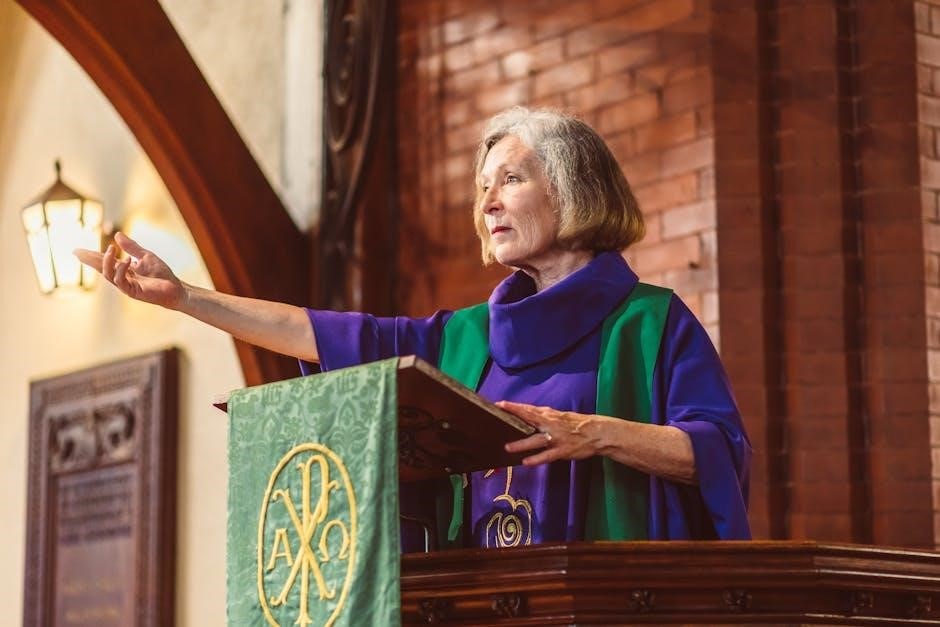Church leadership roles are essential for guiding congregations‚ ensuring spiritual growth‚ and managing church operations effectively. This guide explores key responsibilities and the importance of effective leadership in fulfilling the church’s mission.
Overview of Church Leadership Structure

The church leadership structure is designed to ensure effective governance‚ spiritual guidance‚ and operational efficiency. Typically‚ it consists of three main categories: Ministry Roles‚ Administrative Roles‚ and Board Roles. Ministry Roles include pastors‚ elders‚ and deacons‚ who focus on spiritual oversight‚ discipleship‚ and practical service. Administrative Roles support daily operations‚ such as finance‚ communication‚ and facility management. Board Roles‚ like trustees or council members‚ oversee strategic decisions and ensure alignment with the church’s mission. This structure promotes accountability‚ collaboration‚ and a clear division of responsibilities‚ enabling the church to function harmoniously and fulfill its purpose effectively.
Importance of Defined Roles in Church Governance

Defined roles in church governance are crucial for maintaining order‚ accountability‚ and effectiveness. They ensure that each leader understands their responsibilities‚ preventing overlap and gaps in oversight. Clear roles promote unity by aligning efforts toward common goals‚ fostering a cohesive vision for the congregation. They also enable spiritual growth by providing structured discipleship and guidance. Effective role definition enhances transparency and trust among members‚ as leaders are held accountable for their duties. Ultimately‚ well-defined roles allow the church to function as a unified body‚ fulfilling its mission with clarity and purpose‚ and ensuring the congregation thrives spiritually and operationally.

Key Church Leadership Roles
Church leadership includes pastors‚ elders‚ deacons‚ and administrative roles‚ each contributing uniquely to guiding the congregation‚ overseeing ministries‚ and ensuring the church’s mission is fulfilled effectively;
Pastors: Spiritual Guidance and Visionary Leadership
Pastors play a vital role in providing spiritual guidance‚ preaching the Word‚ and setting a visionary direction for the church. They are responsible for nurturing the congregation’s faith‚ offering counsel‚ and leading worship services. Pastors also oversee church ministries‚ ensuring alignment with the church’s mission and values. Their leadership fosters a sense of community and spiritual growth among members. By walking closely with God‚ pastors model Christ-like behavior and inspire others to deepen their relationship with Him. Effective pastors balance teaching‚ mentoring‚ and visionary leadership to guide the church toward fulfilling its purpose in serving both the congregation and the wider community.
Elders: Oversight and Shepherding the Congregation
Elders serve as spiritual overseers‚ providing guidance and shepherding the congregation with wisdom and compassion. They work closely with pastors to ensure the church remains aligned with biblical principles and its mission. Elders are responsible for spiritual oversight‚ governance‚ and addressing congregational needs. They often handle disciplinary matters and conflict resolution‚ fostering unity and harmony within the church. Elders are expected to model Christ-like behavior‚ demonstrating integrity and a deep commitment to prayer and scripture. Their role involves equipping believers for ministry and ensuring the church operates in accordance with God’s will. Effective elders balance leadership with humility‚ prioritizing the spiritual well-being of the congregation above all else.
Deacons: Servant Leadership and Practical Ministry
Deacons embody servant leadership by focusing on practical ministries that support the congregation and free pastors and elders to concentrate on spiritual matters. Their roles often include overseeing benevolence‚ managing church facilities‚ and coordinating community service initiatives. Deacons are responsible for identifying and addressing the physical and emotional needs of church members‚ ensuring no one is overlooked. They also assist in worship services and provide support during special events. By handling logistical and practical tasks‚ deacons enable the church to function smoothly and effectively. Their ministry is rooted in humility and a commitment to serving others‚ reflecting Christ’s example of selfless love and care for His people.
Administrative Roles: Supporting Church Operations
Administrative roles are vital in ensuring the smooth operation of church activities and facilities. These positions handle tasks such as financial management‚ human resources‚ IT support‚ and office administration. Responsibilities include overseeing budgets‚ maintaining records‚ and ensuring compliance with legal requirements. Administrative leaders also manage church facilities‚ coordinating maintenance and upgrades to create a welcoming environment for worship and ministry. Additionally‚ they support communication efforts‚ such as managing websites and social media‚ to keep the congregation informed and engaged. By focusing on operational excellence‚ administrative roles enable pastors‚ elders‚ and ministry leaders to concentrate on spiritual guidance and outreach. Their behind-the-scenes work is essential for the church’s effectiveness and sustainability.
Board Roles: Governance and Strategic Decision-Making
Church boards play a critical role in governance and strategic decision-making‚ ensuring the church operates in alignment with its mission and values. Board members‚ such as the chairman‚ secretary‚ and treasurer‚ oversee policy development‚ financial oversight‚ and legal compliance. They collaborate with pastors and other leaders to set long-term goals and guide the church’s direction. Board roles also involve evaluating ministry effectiveness and addressing operational challenges; Their decisions impact the church’s ability to serve the congregation and community. By providing strategic leadership‚ board members help the church remain focused on its purpose while navigating future opportunities and challenges. Their governance ensures accountability and sustainability for the church’s mission.

Responsibilities of Church Leaders

Church leaders are responsible for guiding the congregation‚ fostering spiritual growth‚ managing resources‚ and engaging the community. Their roles include discipleship‚ oversight‚ financial stewardship‚ and outreach‚ ensuring the church’s mission is fulfilled with integrity and collaboration.
Spiritual Leadership: Discipleship and Biblical Guidance
Spiritual leadership is the cornerstone of church governance‚ focusing on discipleship and biblical guidance. Church leaders are tasked with fostering a deeper relationship between members and God through teachings‚ prayer‚ and mentorship. They ensure that the congregation remains aligned with biblical principles‚ providing guidance on spiritual matters and encouraging personal growth. Effective spiritual leaders model Christ-like behavior‚ equipping believers to live out their faith authentically. This role involves preaching‚ teaching‚ and counseling‚ helping members navigate life’s challenges with a biblical perspective. By prioritizing spiritual health‚ leaders empower the church to fulfill its mission and impact the community meaningfully.
Ministry Oversight: Ensuring Effective Ministry Programs
Church leaders are responsible for overseeing ministry programs to ensure their effectiveness and alignment with the church’s mission. This involves planning‚ implementing‚ and evaluating ministries to meet the spiritual and practical needs of the congregation. Leaders must allocate resources‚ provide guidance‚ and support ministry teams to achieve their goals. Effective oversight includes fostering collaboration among volunteers‚ staff‚ and members to create a cohesive and impactful ministry environment. Regular assessment and adaptation of programs are essential to address changing needs and maintain relevance. By ensuring ministries are well-organized and purpose-driven‚ leaders help the church fulfill its calling to serve and disciple effectively.

Financial Stewardship: Managing Church Resources
Church leaders play a critical role in ensuring responsible financial stewardship. This involves managing church resources with integrity‚ transparency‚ and accountability to fulfill the church’s mission. Leaders must oversee budgeting‚ financial planning‚ and resource allocation to ensure alignment with biblical principles and the congregation’s needs. Effective financial stewardship requires regular audits‚ clear reporting‚ and ethical practices to maintain trust and accountability. By prioritizing prudent financial management‚ leaders safeguard the church’s assets and ensure that resources are used to advance ministry goals and support the community. Proper stewardship reflects a commitment to honoring God and serving the congregation faithfully.
Community Engagement: Building Relationships and Outreach
Church leaders are called to foster meaningful connections within the community and beyond. Community engagement involves building relationships through outreach programs‚ service initiatives‚ and partnerships with local organizations. Leaders must encourage participation in missions‚ volunteer work‚ and evangelism to spread the gospel and demonstrate Christ’s love. Effective engagement strategies include organizing events‚ supporting vulnerable groups‚ and addressing social issues. By actively engaging the community‚ leaders help the church become a beacon of hope and compassion. This outreach not only strengthens ties with neighbors but also invites others to experience the transformative power of faith‚ creating a ripple effect of kindness and grace.
Qualities and Qualifications of Effective Church Leaders
Effective church leaders must possess spiritual maturity‚ integrity‚ strong leadership skills‚ and a vision for ministry. They should demonstrate compassion‚ humility‚ and the ability to inspire others.
Spiritual Maturity and Integrity
Spiritual Maturity and Integrity
Spiritual maturity and integrity are foundational for church leaders‚ ensuring they model Christ-like behavior and guide their congregation effectively. These qualities involve a deep personal relationship with God‚ demonstrated through prayer‚ biblical knowledge‚ and consistent ethical conduct. Leaders must embody humility‚ transparency‚ and accountability‚ fostering trust within the church community. Their commitment to spiritual growth encourages others to pursue a life of discipleship and faith. Without these pillars‚ leaders risk losing credibility and failing to inspire genuine spiritual transformation. Thus‚ spiritual maturity and integrity are non-negotiable‚ forming the bedrock of effective and godly leadership in the church.

Leadership Skills and Visionary Thinking
Effective church leaders must possess strong leadership skills and visionary thinking to guide their congregation toward a shared purpose. Visionary thinking enables leaders to set a clear direction‚ inspiring others to work collaboratively toward common goals. Strong communication‚ decision-making‚ and problem-solving abilities are essential for navigating challenges and fostering growth. A visionary leader encourages innovation while remaining rooted in biblical principles‚ ensuring the church remains relevant in a changing world. By aligning their vision with the church’s mission‚ leaders can motivate members to actively participate in ministries and outreach efforts‚ ultimately strengthening the church’s impact in the community and beyond.

Ability to Collaborate and Communicate Effectively
Effective church leaders must excel in collaboration and communication to foster unity and achieve shared goals. Collaboration involves working alongside volunteers‚ staff‚ and congregation members to ensure alignment in ministry efforts. Strong communication skills are vital for clearly articulating vision‚ providing guidance‚ and addressing concerns. Active listening‚ empathy‚ and transparency build trust and strengthen relationships within the church. Leaders who communicate effectively can inspire others‚ resolve conflicts‚ and promote a culture of openness. By fostering teamwork and maintaining clear lines of communication‚ leaders ensure the church functions harmoniously and remains focused on its mission. This ability is foundational for building a cohesive and purpose-driven church community.
The future of church leadership lies in embracing diversity‚ fostering collaboration‚ and leveraging technology to create inclusive and innovative ministries that inspire and unite communities effectively.
Emerging Trends in Church Leadership Roles
Emerging trends in church leadership emphasize diversity‚ inclusivity‚ and technology integration. There is a growing recognition of the importance of women and minority representation in leadership roles. Churches are adopting digital platforms for worship‚ outreach‚ and administration‚ enhancing accessibility and engagement; Collaborative leadership models are gaining traction‚ fostering teamwork among pastors‚ elders‚ and lay leaders. Additionally‚ there is a shift toward equipping leaders with skills to address contemporary issues like mental health and social justice. These trends reflect a dynamic evolution in church leadership‚ aiming to meet the needs of modern congregations while remaining rooted in biblical principles. Effective adaptation to these changes is crucial for sustaining vibrant and relevant church communities.
The Role of Diversity and Inclusion in Church Leadership
Diversity and inclusion are increasingly recognized as vital components of effective church leadership. Churches are embracing the value of varied perspectives‚ fostering environments where individuals from all backgrounds feel valued. This shift reflects the biblical principle of unity in diversity‚ as seen in Galatians 3:28. Women and minorities are gaining prominence in leadership roles‚ challenging traditional norms and enriching decision-making processes. Pope Francis has advocated for expanded roles for women‚ acknowledging their contributions to church life. Inclusive leadership not only enhances relational dynamics but also strengthens the church’s ability to minister to diverse communities. By prioritizing diversity‚ churches can better reflect God’s image and fulfill their mission in a globalized world.
